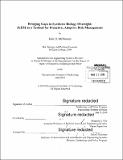Bridging gaps in synthetic biology oversight : iGEM as a testbed for proactive, adaptive risk management
Author(s)
McNamara, Julie H. (Julie Hutton)
DownloadFull printable version (9.848Mb)
Alternative title
International Genetically Engineered Machine as a testbed for proactive, adaptive risk management
Other Contributors
Massachusetts Institute of Technology. Technology and Policy Program.
Advisor
Kenneth A. Oye.
Terms of use
Metadata
Show full item recordAbstract
On the surface, the emerging field of synthetic biology looks highly similar to that of genetic engineering. However, the two fields are based upon divergent underlying logic structures. Whereas genetic engineering affects change through localized modifications of existing organisms, synthetic biology attempts to fuse independent component parts to create wholly novel applications. While legacy regulatory systems were adequate for monitoring biosafety in the early days of the emerging field, as synthetic biology advances, the fundamental differences in its logic structure are creating fissures in the oversight system. A continued reliance on increasingly incompatible mechanisms squanders the limited present opportunity for proactive risk management, and generates increasing potential for significant future risk exposure in the field. This thesis will describe the current state of domestic and international oversight systems relevant to synthetic biology, and characterize their limits and vulnerabilities. It will argue that the current approach of relying on prescriptive, sequence-based controls creates growing gaps in oversight for a field moving toward amalgam organisms, and that the soft methods intended to bridge these gaps, predominantly in the form of institutional biosafety committees, are instead points of additional significant vulnerability. This thesis will also illustrate the challenges that have arisen because of these gaps, both in theory and in practice, through an examination of the International Genetically Engineered Machine competition (iGEM). iGEM, a university-level synthetic biology contest, first served as a valuable case study for illuminating challenges associated with the current system. Later, the Massachusetts Institute of Technology's Program on Emerging Technologies collaborated with iGEM to establish the competition as a policy testbed for demonstrating innovative approaches to biosafety oversight. This thesis will conclude by proposing recommendations for improving biosafety oversight based on lessons learned from the iGEM testbed. First, it is not enough for scientists to recognize that risks exist in their field; as the first line of defense in risk management, they must also be able to identify, understand, and engage with the risks inherent in their own work. Second, in light of the limits imposed on policy revisions due to political gridlock, it is necessary to understand what can be realistically accomplished within the existing federal system, and what instead needs to be achieved outside it. Here, a fuller, more invigorated approach to engagement support is coupled with a mix of improved, adaptive interpretations of the existing oversight system.
Description
Thesis: S.M. in Technology and Policy, Massachusetts Institute of Technology, Engineering Systems Division, Technology and Policy Program, 2014. Cataloged from PDF version of thesis. Includes bibliographical references (pages 84-90).
Date issued
2014Department
Massachusetts Institute of Technology. Engineering Systems Division; Technology and Policy ProgramPublisher
Massachusetts Institute of Technology
Keywords
Engineering Systems Division., Technology and Policy Program.